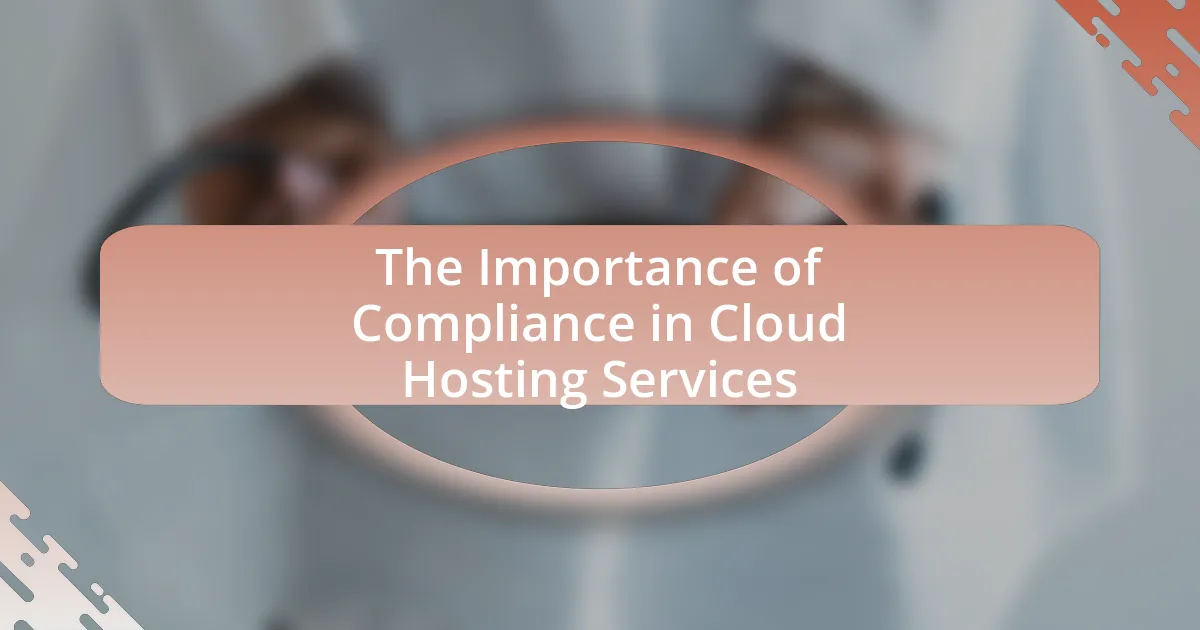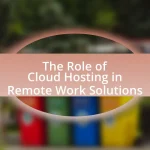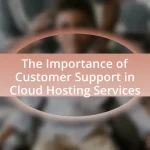Compliance in cloud hosting services is essential for ensuring data security, legal adherence, and maintaining customer trust. Organizations must comply with regulations such as GDPR, HIPAA, and PCI DSS to protect sensitive information and avoid severe legal and financial repercussions. The article outlines the critical role of compliance in enhancing data security, the consequences of non-compliance, and the best practices that cloud hosting services can implement to meet regulatory standards. Additionally, it discusses the impact of compliance on customer acquisition and retention, emerging trends in the compliance landscape, and strategies for cloud providers to stay ahead of regulatory changes.
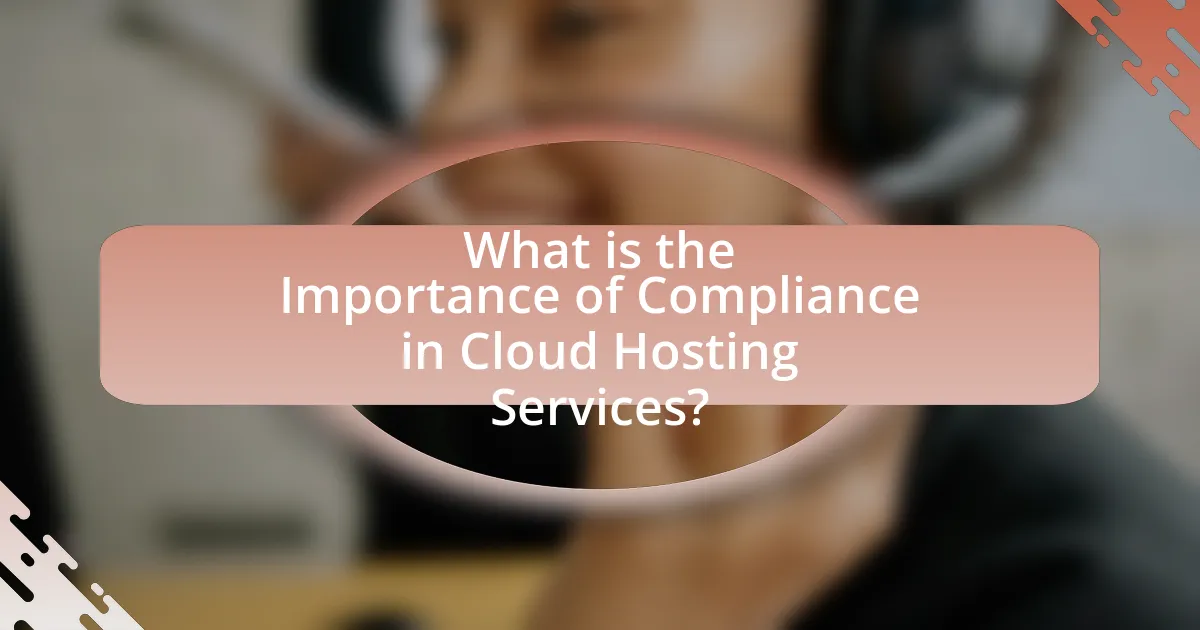
What is the Importance of Compliance in Cloud Hosting Services?
Compliance in cloud hosting services is crucial for ensuring data security, legal adherence, and maintaining customer trust. Organizations must comply with regulations such as GDPR, HIPAA, and PCI DSS to protect sensitive information and avoid legal penalties. For instance, non-compliance can result in fines that can reach millions of dollars, as seen in cases involving data breaches. Furthermore, compliance frameworks provide guidelines that help organizations implement best practices for data management and security, thereby reducing risks associated with data loss or unauthorized access.
Why is compliance critical for cloud hosting providers?
Compliance is critical for cloud hosting providers because it ensures adherence to legal, regulatory, and industry standards that protect data privacy and security. By meeting compliance requirements, cloud providers mitigate risks associated with data breaches and legal penalties, which can result in significant financial losses and damage to reputation. For instance, compliance with regulations such as GDPR mandates strict data protection measures, and failure to comply can lead to fines up to 4% of annual global turnover. Additionally, compliance fosters customer trust, as clients are more likely to choose providers that demonstrate a commitment to safeguarding sensitive information.
What regulations must cloud hosting services adhere to?
Cloud hosting services must adhere to various regulations, including the General Data Protection Regulation (GDPR) in Europe, the Health Insurance Portability and Accountability Act (HIPAA) in the United States for healthcare data, and the Federal Risk and Authorization Management Program (FedRAMP) for federal data. These regulations ensure that cloud providers implement necessary security measures, protect user data, and maintain compliance with legal standards. For instance, GDPR mandates strict data protection and privacy protocols for organizations handling personal data of EU citizens, while HIPAA sets standards for safeguarding sensitive health information. Compliance with these regulations is crucial for cloud hosting services to avoid legal penalties and build trust with customers.
How does compliance impact data security in cloud hosting?
Compliance significantly enhances data security in cloud hosting by ensuring that service providers adhere to established regulations and standards, such as GDPR, HIPAA, and ISO 27001. These regulations mandate specific security measures, including data encryption, access controls, and regular audits, which collectively reduce the risk of data breaches and unauthorized access. For instance, a study by the Ponemon Institute found that organizations with compliance frameworks in place experienced 50% fewer data breaches compared to those without. This correlation underscores the critical role compliance plays in fortifying data security within cloud environments.
What are the consequences of non-compliance in cloud hosting?
Non-compliance in cloud hosting can lead to severe legal and financial repercussions for organizations. Companies may face hefty fines, as regulatory bodies impose penalties for violations of data protection laws such as GDPR or HIPAA, which can reach millions of dollars depending on the severity of the breach. Additionally, non-compliance can result in loss of customer trust and damage to brand reputation, as clients may choose to take their business elsewhere if they perceive a lack of data security. Furthermore, organizations may encounter operational disruptions, as they may be required to halt services to address compliance issues, leading to potential revenue loss. According to a report by the Ponemon Institute, the average cost of a data breach is approximately $3.86 million, highlighting the financial impact of non-compliance.
What legal implications arise from failing to comply?
Failing to comply with regulations in cloud hosting services can lead to significant legal implications, including fines, penalties, and potential lawsuits. Regulatory bodies, such as the General Data Protection Regulation (GDPR) in Europe, impose strict penalties for non-compliance, which can reach up to 4% of annual global turnover or €20 million, whichever is higher. Additionally, organizations may face civil lawsuits from affected parties, resulting in further financial liabilities and reputational damage. Non-compliance can also lead to loss of certifications and licenses necessary for operation, restricting business activities and access to markets.
How can non-compliance affect customer trust and business reputation?
Non-compliance can significantly erode customer trust and damage business reputation. When a company fails to adhere to regulations or industry standards, customers may perceive it as untrustworthy or negligent, leading to a loss of confidence in the brand. For instance, a study by PwC found that 87% of consumers will take their business elsewhere if they feel a company is not compliant with data protection regulations. This perception can result in negative reviews, decreased customer loyalty, and ultimately, a decline in revenue. Furthermore, non-compliance can attract legal penalties and fines, further tarnishing the business’s public image and credibility.
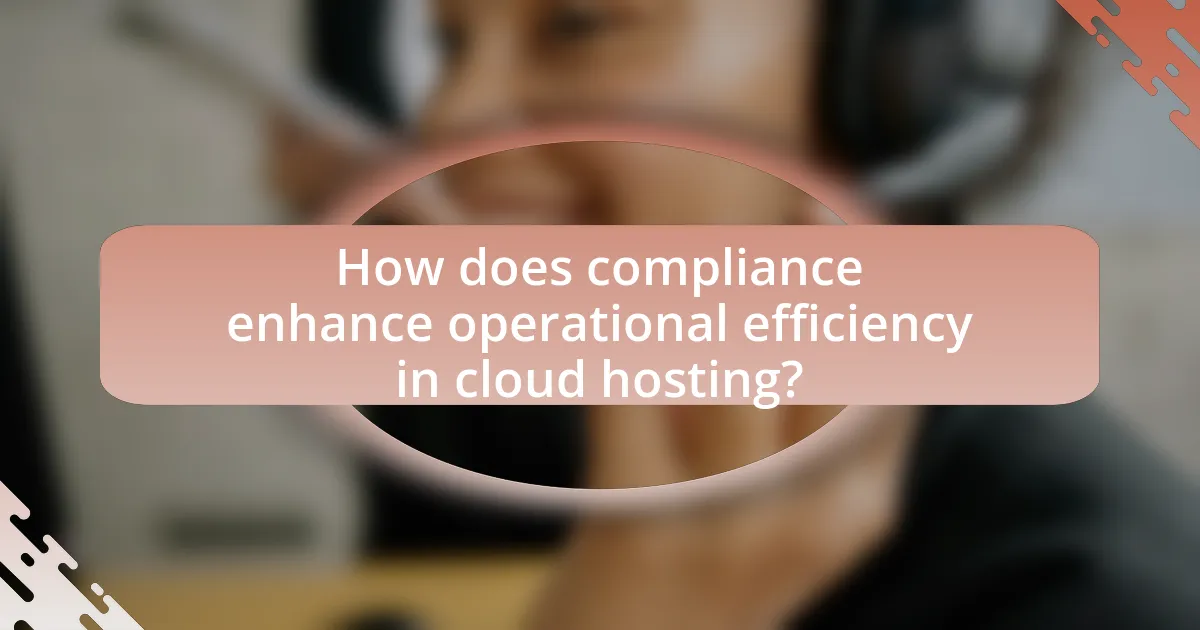
How does compliance enhance operational efficiency in cloud hosting?
Compliance enhances operational efficiency in cloud hosting by establishing standardized processes and protocols that streamline operations. By adhering to regulatory requirements, cloud service providers can minimize risks associated with data breaches and legal penalties, which in turn reduces downtime and operational disruptions. For instance, compliance frameworks like ISO 27001 and GDPR provide clear guidelines that help organizations implement best practices in data management and security. This structured approach not only fosters trust among clients but also optimizes resource allocation, leading to improved service delivery and cost-effectiveness.
What best practices can cloud hosting services implement for compliance?
Cloud hosting services can implement best practices for compliance by adopting a comprehensive framework that includes data encryption, regular audits, and adherence to industry standards. Data encryption ensures that sensitive information is protected both in transit and at rest, reducing the risk of unauthorized access. Regular audits help identify vulnerabilities and ensure that compliance measures are effectively implemented and maintained. Adhering to industry standards, such as ISO 27001 or GDPR, provides a structured approach to compliance and demonstrates a commitment to data protection. These practices collectively enhance the security posture of cloud hosting services and ensure they meet regulatory requirements.
How do audits and assessments contribute to compliance?
Audits and assessments contribute to compliance by systematically evaluating an organization’s adherence to regulatory standards and internal policies. These processes identify gaps in compliance, ensuring that organizations implement necessary corrective actions to meet legal and industry requirements. For instance, a study by the International Organization for Standardization (ISO) found that organizations that regularly conduct audits are 30% more likely to maintain compliance with relevant regulations. This demonstrates that audits and assessments are essential tools for fostering a culture of accountability and continuous improvement in compliance practices.
What role does employee training play in maintaining compliance?
Employee training plays a crucial role in maintaining compliance by ensuring that staff are knowledgeable about relevant regulations and company policies. This training equips employees with the skills and understanding necessary to adhere to compliance standards, thereby reducing the risk of violations. For instance, organizations that implement regular compliance training programs report a 50% decrease in compliance-related incidents, as employees are better prepared to recognize and address potential issues. Furthermore, ongoing training fosters a culture of accountability and awareness, which is essential for sustaining compliance in dynamic environments like cloud hosting services.
How can compliance lead to competitive advantages in the cloud market?
Compliance can lead to competitive advantages in the cloud market by enhancing trust and credibility with customers. When cloud service providers adhere to industry regulations and standards, such as GDPR or HIPAA, they demonstrate a commitment to data security and privacy, which can attract clients who prioritize these factors. For instance, a study by the Cloud Security Alliance found that 93% of organizations consider compliance a critical factor when selecting a cloud provider. This adherence not only mitigates risks associated with data breaches but also positions compliant providers as leaders in a market where regulatory scrutiny is increasing, thereby differentiating them from competitors who may not meet the same standards.
What certifications can cloud hosting services obtain to demonstrate compliance?
Cloud hosting services can obtain several certifications to demonstrate compliance, including ISO 27001, SOC 2, PCI DSS, and HIPAA. ISO 27001 certifies an organization’s information security management system, ensuring that data is managed securely. SOC 2 focuses on the controls related to security, availability, processing integrity, confidentiality, and privacy of customer data. PCI DSS is essential for any service handling credit card transactions, ensuring secure processing of payment information. HIPAA compliance is crucial for cloud services that handle protected health information, ensuring that they meet the necessary standards for safeguarding sensitive health data. These certifications provide assurance to customers that the cloud hosting services adhere to recognized security and compliance standards.
How does compliance influence customer acquisition and retention?
Compliance significantly influences customer acquisition and retention by establishing trust and credibility with potential and existing customers. When cloud hosting services adhere to regulatory standards, such as GDPR or HIPAA, they demonstrate a commitment to data protection and security, which is crucial for customers concerned about privacy. According to a study by the Ponemon Institute, 70% of consumers are more likely to engage with companies that prioritize compliance, indicating that adherence to regulations can directly enhance customer acquisition. Furthermore, maintaining compliance helps retain customers by minimizing the risk of data breaches and associated penalties, which can lead to customer churn. A report from IBM shows that organizations with strong compliance programs experience 50% fewer data breaches, reinforcing the idea that compliance is essential for both attracting new customers and keeping existing ones.
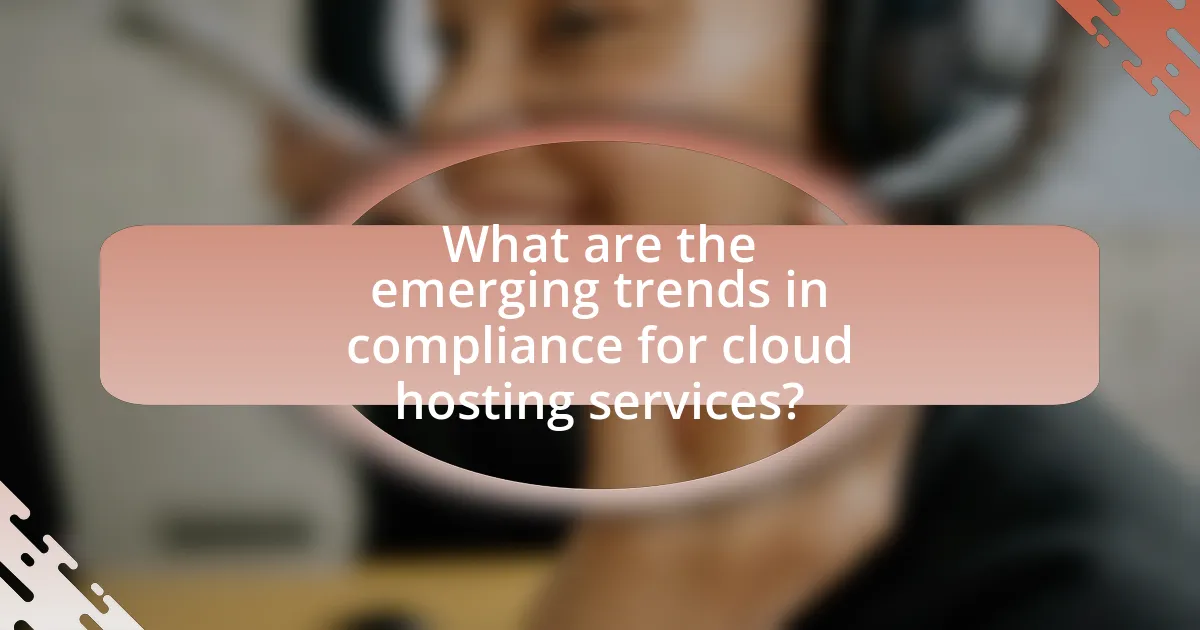
What are the emerging trends in compliance for cloud hosting services?
Emerging trends in compliance for cloud hosting services include increased regulatory scrutiny, the adoption of automated compliance tools, and a focus on data sovereignty. Regulatory bodies are intensifying their oversight of cloud services, leading to stricter adherence to standards such as GDPR and CCPA. Automated compliance tools are being implemented to streamline processes, reduce human error, and ensure continuous monitoring of compliance status. Additionally, organizations are prioritizing data sovereignty, which requires data to be stored and processed within specific geographic boundaries to comply with local laws. These trends reflect the evolving landscape of compliance as organizations adapt to new regulations and technological advancements.
How is technology shaping compliance requirements in cloud hosting?
Technology is shaping compliance requirements in cloud hosting by enabling automated monitoring and reporting systems that ensure adherence to regulatory standards. These advancements allow cloud service providers to implement real-time compliance checks, reducing the risk of human error and enhancing data security. For instance, technologies such as artificial intelligence and machine learning can analyze vast amounts of data to identify compliance gaps and generate alerts, facilitating timely corrective actions. Additionally, cloud hosting platforms often integrate compliance frameworks like GDPR and HIPAA directly into their services, making it easier for organizations to meet legal obligations. This integration is evidenced by the increasing adoption of cloud solutions that offer built-in compliance tools, which have become essential for businesses operating in regulated industries.
What impact do advancements in AI and automation have on compliance processes?
Advancements in AI and automation significantly enhance compliance processes by increasing efficiency and accuracy in monitoring and reporting. These technologies enable organizations to automate routine compliance tasks, such as data collection and risk assessments, which reduces human error and accelerates response times. For instance, AI algorithms can analyze vast amounts of data to identify compliance risks in real-time, allowing companies to address issues proactively. According to a report by Deloitte, organizations that implement AI-driven compliance solutions can reduce compliance costs by up to 30% while improving adherence to regulations. This demonstrates that the integration of AI and automation not only streamlines compliance workflows but also strengthens overall regulatory compliance.
How are data privacy laws evolving in relation to cloud hosting services?
Data privacy laws are evolving to impose stricter regulations on cloud hosting services, reflecting growing concerns over data security and user privacy. Recent legislation, such as the General Data Protection Regulation (GDPR) in Europe and the California Consumer Privacy Act (CCPA) in the United States, mandates that cloud service providers implement robust data protection measures and ensure transparency in data handling practices. These laws require companies to obtain explicit consent from users before processing their personal data and grant users rights to access, modify, and delete their information. Compliance with these regulations is essential for cloud hosting services to avoid significant fines and maintain customer trust, as evidenced by the enforcement actions taken against companies that fail to adhere to these standards.
What future challenges might cloud hosting services face regarding compliance?
Cloud hosting services will face significant challenges regarding compliance due to evolving regulations and data protection laws. As governments worldwide implement stricter data privacy regulations, such as the General Data Protection Regulation (GDPR) in Europe and the California Consumer Privacy Act (CCPA) in the United States, cloud providers must continuously adapt their practices to ensure compliance. This includes implementing robust data governance frameworks, conducting regular audits, and ensuring transparency in data handling processes. Additionally, the rise of cross-border data transfer regulations complicates compliance, as cloud services often operate in multiple jurisdictions with varying legal requirements. Failure to comply can result in substantial fines and reputational damage, underscoring the critical need for cloud hosting services to stay ahead of regulatory changes and invest in compliance technologies.
How can cloud hosting providers prepare for upcoming regulatory changes?
Cloud hosting providers can prepare for upcoming regulatory changes by implementing robust compliance frameworks and regularly updating their policies to align with new regulations. This involves conducting thorough risk assessments to identify potential compliance gaps and investing in training programs for staff to ensure they understand regulatory requirements. Additionally, cloud providers should establish partnerships with legal experts to stay informed about changes in legislation, such as the General Data Protection Regulation (GDPR) and the California Consumer Privacy Act (CCPA), which have set precedents for data protection standards. By proactively adapting their infrastructure and processes to meet these evolving standards, cloud hosting providers can mitigate risks and enhance their credibility in the market.
What strategies can be employed to stay ahead of compliance trends?
To stay ahead of compliance trends, organizations should implement proactive monitoring and continuous education strategies. Proactive monitoring involves regularly assessing regulatory changes and industry standards to identify emerging compliance requirements. Continuous education ensures that employees are informed about the latest compliance practices and regulations, fostering a culture of compliance within the organization. According to a report by Deloitte, companies that invest in compliance training and monitoring systems are 50% more likely to adapt quickly to regulatory changes, demonstrating the effectiveness of these strategies in maintaining compliance.
What are the best practices for ensuring compliance in cloud hosting services?
The best practices for ensuring compliance in cloud hosting services include implementing robust security measures, conducting regular audits, and adhering to industry standards and regulations. Organizations should utilize encryption for data at rest and in transit to protect sensitive information, as this is a fundamental requirement for compliance with regulations such as GDPR and HIPAA. Regular audits help identify vulnerabilities and ensure that security protocols are being followed, which is essential for maintaining compliance. Additionally, aligning with industry standards like ISO 27001 or NIST can provide a framework for compliance and risk management, as these standards outline best practices for information security management systems.
